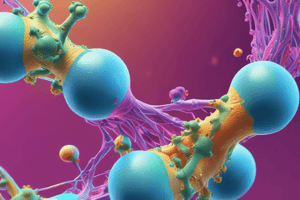Podcast
Questions and Answers
What second messenger is produced when adenylyl cyclase is activated?
What second messenger is produced when adenylyl cyclase is activated?
- cGMP
- IP3
- cAMP (correct)
- DAG
Which role does diacylglycerol (DAG) play in cellular signaling?
Which role does diacylglycerol (DAG) play in cellular signaling?
- It activates protein kinase C (PKC). (correct)
- It opens Ca2+ channels in the endoplasmic reticulum.
- It binds and activates adenylyl cyclase.
- It directly phosphorylates protein substrates.
What is the primary effect of calcium ions in the cytosol?
What is the primary effect of calcium ions in the cytosol?
- They cause the dissolution of cellular membranes.
- They activate calmodulin and related proteins. (correct)
- They inhibit protein synthesis.
- They degrade second messengers.
What is produced when guanylyl cyclase is activated?
What is produced when guanylyl cyclase is activated?
Which of the following processes does not involve phospholipase C?
Which of the following processes does not involve phospholipase C?
What defines Group I hormones?
What defines Group I hormones?
How do Group II hormones initiate signal transduction?
How do Group II hormones initiate signal transduction?
Which mechanism is primarily used by lipophilic hormones for signal transduction?
Which mechanism is primarily used by lipophilic hormones for signal transduction?
What role does the enzyme cascade play in signal transduction?
What role does the enzyme cascade play in signal transduction?
What type of receptors are involved with G protein coupled receptors?
What type of receptors are involved with G protein coupled receptors?
Which of the following is NOT a group of secondary messengers?
Which of the following is NOT a group of secondary messengers?
What effect does the activation of a catalytic receptor have?
What effect does the activation of a catalytic receptor have?
What is the main function of signal transduction at the cellular level?
What is the main function of signal transduction at the cellular level?
What is the primary function of the cGMP-dependent protein kinase (PKG)?
What is the primary function of the cGMP-dependent protein kinase (PKG)?
Which enzyme catalyzes the conversion of GTP to cGMP?
Which enzyme catalyzes the conversion of GTP to cGMP?
Which pathway directly leads to an increase in intracellular calcium concentration?
Which pathway directly leads to an increase in intracellular calcium concentration?
What characterizes the Na/Ca pump in terms of capacity and affinity?
What characterizes the Na/Ca pump in terms of capacity and affinity?
Which of the following is produced in the cardiac atrial tissue?
Which of the following is produced in the cardiac atrial tissue?
What is the role of phospholipase C in calcium signaling?
What is the role of phospholipase C in calcium signaling?
Which of the following pumps has a high affinity for calcium but low capacity?
Which of the following pumps has a high affinity for calcium but low capacity?
What effect does increased cGMP have on smooth muscle tissue?
What effect does increased cGMP have on smooth muscle tissue?
What is the primary function of adenylyl cyclase in the signal transduction mechanism?
What is the primary function of adenylyl cyclase in the signal transduction mechanism?
Which type of G protein is considered inhibitory?
Which type of G protein is considered inhibitory?
What activates the effector enzyme adenylyl cyclase?
What activates the effector enzyme adenylyl cyclase?
How are the heterotrimeric G proteins characterized?
How are the heterotrimeric G proteins characterized?
Which of the following is NOT a characteristic of heterotrimeric G proteins?
Which of the following is NOT a characteristic of heterotrimeric G proteins?
What happens to the alpha subunit of G proteins when the hormone dissociates from its receptor?
What happens to the alpha subunit of G proteins when the hormone dissociates from its receptor?
Which G protein subunit is capable of interacting with specific enzymes?
Which G protein subunit is capable of interacting with specific enzymes?
Which of the following receptors does NOT require second messengers for their action?
Which of the following receptors does NOT require second messengers for their action?
What distinguishes catalytic receptors from other types of receptors?
What distinguishes catalytic receptors from other types of receptors?
Which of the following hormones does NOT utilize the signaling pathway involving nonreceptor tyrosine kinases?
Which of the following hormones does NOT utilize the signaling pathway involving nonreceptor tyrosine kinases?
What initiates the action of nuclear receptors bound to HRE?
What initiates the action of nuclear receptors bound to HRE?
What characterizes the action of cytoplasmic receptors when they bind to hormones?
What characterizes the action of cytoplasmic receptors when they bind to hormones?
What is one of the primary characteristics of the hormone response elements (HRE)?
What is one of the primary characteristics of the hormone response elements (HRE)?
Which family of nonreceptor tyrosine kinases is particularly well characterized?
Which family of nonreceptor tyrosine kinases is particularly well characterized?
What happens to nuclear receptors when they are inactive?
What happens to nuclear receptors when they are inactive?
Which of the following correctly describes the characteristics of signaling for lipid-soluble hormones?
Which of the following correctly describes the characteristics of signaling for lipid-soluble hormones?
Flashcards are hidden until you start studying
Study Notes
Signal Transduction
- Refers to the process by which external signals are transmitted to the interior of a cell.
- Signals can activate effector enzymes, causing a cascade of cellular changes.
- Key players include G proteins, which bind GTP and hydrolyze it to GDP.
Classes of Hormones
- Group I: Lipid-soluble (lipophilic), pass through cell membranes and bind to intracellular receptors, influencing gene transcription.
- Group II: Water-soluble (hydrophilic) hormones bind to membrane receptors, triggering secondary messenger systems for intracellular signaling.
G Protein Coupled Receptors (GPCR)
- Largest family of cell surface receptors in humans.
- Comprises heterotrimeric G proteins (three subunits: α, β, γ) and the Ras superfamily (monomeric).
- G alpha subunits determine the type of signaling pathway; distinct subunits correspond to specific enzymes like adenylyl cyclase.
Mechanism of Signal Transduction
- Hormone binds to its receptor, activating the G protein.
- G protein activation leads to GDP release and GTP binding on the alpha subunit, which then dissociates from beta and gamma subunits.
- Subsequent activation of enzymes such as adenylyl cyclase produces secondary messengers like cAMP.
Second Messengers
- cAMP activates protein kinase A (PKA), modulating various cellular functions.
- Calcium ions (Ca2+) released from the endoplasmic reticulum activate enzymes via calmodulin.
- Diacylglycerol (DAG) activates protein kinase C (PKC).
Guanylyl Cyclase
- Catalyzes the conversion of GTP to cGMP, involved in signaling for smooth muscle relaxation and vasodilation.
- Exists in membrane-bound and soluble forms; atriopeptins increase cGMP levels.
Catalytic Receptors
- Activate protein kinases directly without requiring second messengers.
- Examples include nonreceptor tyrosine kinases like JAK, which associate with hormone receptors.
Nuclear Receptors
- Bind hormones and specific DNA response elements (HREs), acting as transcription factors.
- Typically exist in an inactive state with a corepressor that is released upon hormone binding.
Key Functional Domains in Receptors
- Ligand Binding Domain: Where hormones bind.
- Gene Regulatory Domain: Contains motifs that interact with DNA to regulate transcription.
- DNA Binding Domain: Involved in binding the hormone-receptor complex to target DNA sequences.
Calcium Regulation
- Calcium levels are altered through channels that hormones can directly open.
- Phospholipase C cascades lead to calcium influx and production of inositol trisphosphate (IP3) and DAG influencing cellular responses.
Summary of Hormonal Actions
- Different hormones can influence cellular processes like gene transcription, protein modification, and enzymatic activity based on their structure and receptors used.
Studying That Suits You
Use AI to generate personalized quizzes and flashcards to suit your learning preferences.




